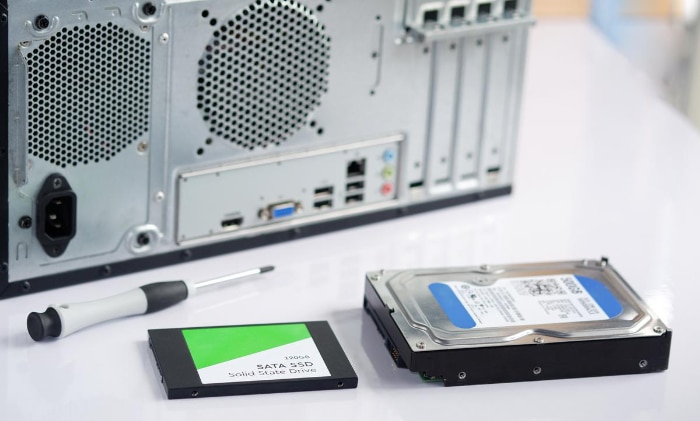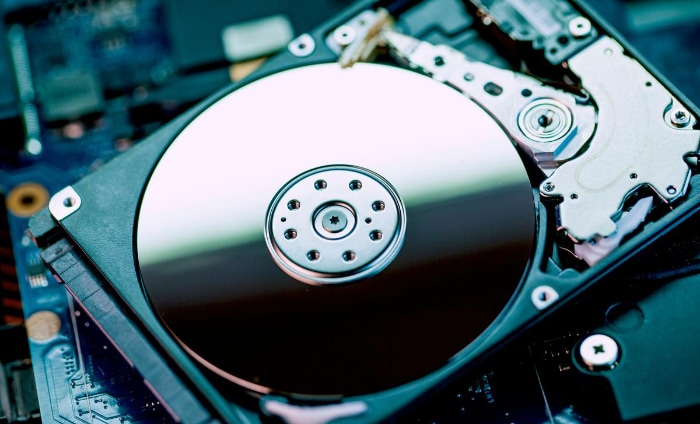Hard Drive Clicking: What It Means

A clicking hard drive can send a chill down the spine of anyone who understands the gravity of what it often indicates: looming hardware failure. If you’ve ever sat next to your computer and heard that ominous click, you know the rush of questions that flood your mind.
Is my data safe? Can the hard drive be saved? What exactly is causing this sound?
Why Hard Drives Click
The phenomenon of a hard drive clicking is often a signal that something isn’t right within the storage device. This unnerving sound can indicate various underlying issues, from mechanical to software-related, which could ultimately jeopardize the integrity of your data and the lifespan of the hard drive itself.
Mechanical Causes of Clicking
Hard drives contain several moving parts, including platters, a spindle motor, and read/write heads. Each of these components plays a role in the smooth operation of the drive.
A malfunction in any one of these elements could lead to the clicking sound.
Misaligned Read/Write Heads
Read/write heads hover just above the platters, responsible for reading and writing data. When these heads become misaligned, they may produce a clicking sound as they attempt to find the correct position.
Spindle Motor Problems
The spindle motor rotates the platters. When it experiences issues like slowdowns or stops, the platters can’t rotate at the optimal speed, leading to a clicking sound.
Software and Firmware Issues
While mechanical causes are common culprits, software and firmware issues can also lead to clicking noises. These might include corrupted sectors or errors in the firmware.
Corrupted Sectors
Sectors that have become corrupted may cause the read/write heads to move erratically, trying to read the data and failing to do so. This can result in the clicking sound.
Firmware Errors
Faulty or outdated firmware can lead to inefficient operation of the hard drive, including problems like clicking. Updating the firmware might resolve the issue.
Power Supply Inconsistencies
Inadequate or fluctuating power supply can also cause hard drives to click. When the hard drive doesn’t receive the necessary power to operate, it may reset repeatedly, causing the read/write heads to move back to their original position, producing a clicking sound.
Voltage and Current Issues
Inconsistent voltage or current can affect the smooth operation of the hard drive. This can result in clicking noises as the drive struggles to perform its tasks.
The Infamous Click of Death
Sometimes the clicking sound is a dire warning sign that the hard drive is on the brink of a total breakdown. Often termed the “click of death,” this indicates severe issues that require immediate attention to prevent irreversible damage and data loss.
The Risks Associated with Hard Drive Clicking
When you hear that unnerving clicking sound from your hard drive, it’s crucial to take it as a red flag. Various risks are linked to this sound, and each one warrants immediate attention.
These risks range from data loss to complete hardware failure, and in some cases, they can even impact other parts of your system.
Data Loss or Corruption
One of the primary concerns with a clicking hard drive is the potential for data loss or corruption. When a hard drive starts clicking, it often means the read/write heads are having trouble reading or writing data correctly, which could result in inaccessible or corrupted files.
Inaccessible Files
A clicking sound is often an indicator that the hard drive is struggling to access specific sectors. As a result, files located in these sectors become difficult to access, posing the risk of partial data loss.
Data Corruption
When the hard drive cannot operate correctly, it can corrupt the data it is trying to read or write. This could mean partially corrupted files or, in the worst case, complete data loss.
Mechanical Failure
Clicking noises from a hard drive often point to mechanical issues that can lead to a complete breakdown if not addressed promptly.
Breakdown of Components
Components like the spindle motor and read/write heads are susceptible to wear and tear. Mechanical failure in these parts can exacerbate the clicking issue, leading to a complete system failure over time.
Shortened Lifespan of the Hard Drive
Even if the clicking issue is temporarily resolved, the hard drive’s lifespan could still be significantly shortened. The mechanical stress involved in issues that cause clicking can accelerate wear and tear.
Reduced Performance
Over time, a clicking hard drive will likely show signs of reduced performance. Slower read and write speeds, for instance, can become increasingly noticeable, hindering your system’s overall efficiency.
Ripple Effect on System Components
It’s not just the hard drive that’s at risk when it starts clicking. Other hardware components can also be affected.
Power Supply Strain
Inconsistent power supply to a failing hard drive can result in voltage fluctuations that strain other components, potentially causing further damage.
Increased CPU Load
When a hard drive struggles to read or write data, the CPU has to work harder to manage these tasks, which could lead to overheating or other issues.
Diagnostic Steps to Isolate the Clicking Issue

Hearing a clicking sound from your hard drive is like hearing an alarm bell—urgent action is required. Thankfully, several diagnostic steps can help you isolate the root cause of this problem.
While some of these procedures are straightforward and can be done by users themselves, others may require professional help. Here are some approaches to diagnosing hard drive clicking issues effectively.
Power Cycle the System
One of the initial steps in diagnosing a clicking hard drive is to restart the system completely. This process can sometimes resolve minor issues that might be causing the clicking sound.
Why Power Cycling Helps
By power cycling, you’re effectively rebooting the hard drive, which can sometimes rectify small issues or glitches that cause clicking noises.
Check Power Supply Voltage and Current
An inconsistent or inadequate power supply could be the reason your hard drive is clicking. Therefore, it’s crucial to ensure that the hard drive is receiving the right voltage and current.
Measuring Voltage and Current
Use a multimeter to measure the voltage and current going to your hard drive. Ensure that these measurements match the hard drive’s specifications.
Use Diagnostic Software
Various software tools can help you assess the health of your hard drive, offering detailed metrics that can pinpoint issues that may be causing the clicking sound.
Types of Diagnostic Software
Some diagnostic software provides a graphical interface that makes it easier to understand the health parameters of your hard drive. These metrics include temperature, read/write errors, and the status of individual sectors.
Manual Inspection
For users who are familiar with hardware, manually inspecting the hard drive can be an option, though it comes with risks. This should only be done in a controlled environment to avoid causing more damage.
What to Look For
Check for any visible signs of wear and tear or any loose components that could be causing the clicking sound. However, be cautious, as opening the hard drive may void your warranty.
Professional Diagnosis for Severe Cases
If the problem persists despite your best efforts, it’s advisable to seek the help of professionals. They have specialized equipment and expertise that can pinpoint the issue with a high degree of accuracy.
When to Consult a Professional
If the clicking persists and you’ve ruled out simpler issues like power supply problems or software errors, professional help is warranted to avoid further damage and data loss.
Troubleshooting and Remedial Actions
When a hard drive starts clicking, immediate action is essential to mitigate risks and preserve data integrity. Several troubleshooting steps and remedial actions can help you either resolve the issue or, at least, provide temporary relief until professional help is sought.
From backing up your data to tinkering with settings, here are some strategies to consider.
Backup Data Immediately
The first and most crucial step when you hear your hard drive clicking is to back up your data to another storage device as quickly as possible.
Why Backups Are Essential
Backing up your data immediately minimizes the risk of data loss, especially if the hard drive is on the brink of failure. It’s a protective measure to ensure that your important files are safe.
Update Firmware and Software
Outdated or corrupted firmware and software can cause the hard drive to click. Make sure to update these to the latest versions.
The Update Process
Usually, you can find updates on the manufacturer’s website. Download and install the latest firmware and software following the guidelines provided by the manufacturer.
Adjust Power Settings
Changing the power settings on your computer can sometimes alleviate the clicking issue by ensuring a consistent power supply to the hard drive.
How to Adjust Power Settings
Navigate to the power settings in your computer’s control panel and select a plan that offers consistent power delivery. Disable any settings that might cut power to the hard drive during inactivity.
Replace or Repair Mechanical Components
If the clicking issue is due to mechanical problems like a faulty spindle motor or misaligned read/write heads, component replacement or repair may be necessary.
DIY vs Professional Repair
While some tech-savvy users might attempt to replace components themselves, this is generally risky and could void the warranty. Therefore, it’s often better to seek professional help for mechanical repairs.
Consult a Professional for Data Recovery and Repairs
If all else fails and the hard drive continues to click, the final step is to consult a professional for data recovery and repairs.
The Role of Data Recovery Services
Professional services use specialized equipment and software to recover data and repair hard drives. They can often retrieve data that would be otherwise lost and perform repairs that are beyond the reach of typical DIY solutions.
Conclusion
Addressing the problem of a clicking hard drive involves a multi-faceted approach that ranges from initial diagnosis to remedial actions. Whether the clicking sound is a symptom of a mechanical failure, software glitch, or power issue, quick and targeted interventions are essential for mitigating data loss and further hardware damage.
By employing a comprehensive set of diagnostic tools and procedures, along with immediate backup and potential software updates, you can make informed decisions on whether professional help is necessary for more severe cases. Ultimately, taking these steps ensures the preservation of your important data and the longevity of your hard drive.



